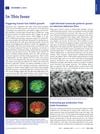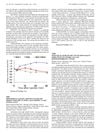
Combining microneedling with platelet-rich plasma enhances skin repair and collagen production but may not offer significant extra benefits.
 January 2018 in “Journal of cosmetology & trichology”
January 2018 in “Journal of cosmetology & trichology” The Automatic Biofibre® Hair Implant is a fast and effective hair restoration method that provides immediate cosmetic benefits and good results in over 90% of cases, but requires proper care to avoid complications.

Tailored nonsurgical cosmetic procedures are crucial for safely treating diverse skin types, especially skin of color.

Proretinal nanoparticles are a safe and effective way to deliver retinal to the skin.
 March 2017 in “InTech eBooks”
March 2017 in “InTech eBooks” Acne vulgaris is a common skin condition that can cause low self-esteem and depression, and early treatment is important to prevent scarring.
 January 2017 in “Springer eBooks”
January 2017 in “Springer eBooks” The document explains various skin conditions and their treatments.
 September 2016 in “Princeton University Press eBooks”
September 2016 in “Princeton University Press eBooks” The document concludes that understanding health requires considering evolutionary perspectives on reproductive fitness, and recognizing the complexity of factors like diet, testosterone, and sexual orientation.
 August 2016 in “Journal of evolution of medical and dental sciences”
August 2016 in “Journal of evolution of medical and dental sciences” Most acne patients were young males with face acne, with many experiencing worsening in summer and diet-related aggravation.
 May 2016 in “Research opinions in animal & veterinary sciences”
May 2016 in “Research opinions in animal & veterinary sciences” Maternal aspartame consumption during pregnancy leads to skin damage and higher apoptosis in newborn rat offspring.
 January 2016 in “Human & Experimental Toxicology”
January 2016 in “Human & Experimental Toxicology” A specific DNA sequence caused hair loss in male mice by activating immune cells and increasing a certain immune signal.
Avicennia Marina extract and avicequinone C can reduce hair loss hormone production and increase hair growth factors, suggesting they could be used to treat androgenic alopecia.

Tissue from dog stem cells helped grow hair in mice.

Glycyrrhizic acid and licorice extract can significantly reduce unwanted hair growth.
 July 2015 in “British Journal of Dermatology”
July 2015 in “British Journal of Dermatology” Treating skin conditions with both psychological and dermatological care improves patient outcomes and can save costs.
 June 2015 in “Journal of the turkish academy of dermatology”
June 2015 in “Journal of the turkish academy of dermatology” Eating the right foods is important for skin health and can help treat some skin conditions.
 January 2015 in “Przegla̧d dermatologiczny”
January 2015 in “Przegla̧d dermatologiczny” 308 nm excimer light therapy may help hair regrowth in alopecia areata with delayed results and no serious side effects.
 January 2015 in “Springer eBooks”
January 2015 in “Springer eBooks” Hair health is influenced by genetics, aging, and environmental factors, with proper care needed to maintain it.

North American ginseng extract helped regrow hair in balding mice.
 November 2014 in “John Wiley & Sons, Ltd eBooks”
November 2014 in “John Wiley & Sons, Ltd eBooks” Eating high-glycemic and dairy foods can increase hormones that may cause acne and other health issues.

Chrysanthemum zawadskii extract may help treat hair loss by promoting hair growth and affecting growth factors.
 December 2013 in “Proceedings of the National Academy of Sciences of the United States of America”
December 2013 in “Proceedings of the National Academy of Sciences of the United States of America” Scientists found a new method using 3D cell cultures to grow human hair which may improve hair restoration treatments.
 November 2013 in “John Wiley & Sons, Ltd eBooks”
November 2013 in “John Wiley & Sons, Ltd eBooks” Skin symptoms can indicate endocrine disorders and have various treatments.

Human scalp hair follicles have PGE2 and its receptors, which might affect hair growth.
 January 2012 in “Yearbook of Dermatology and Dermatologic Surgery”
January 2012 in “Yearbook of Dermatology and Dermatologic Surgery” Iron deficiency is not more common in women with hair loss, and neurogenic rosacea may need different treatment.

Hair follicles can be used to quickly assess drug effects in cancer treatment.

PEGylated liposomal doxorubicin improves cancer treatment effectiveness and reduces side effects like heart damage and hair loss.
 April 2010 in “The Journal of Urology”
April 2010 in “The Journal of Urology” Human prostate cells produce more WISP1/CCN4 when there's not enough oxygen.
 December 2008 in “The American Journal of Cosmetic Surgery”
December 2008 in “The American Journal of Cosmetic Surgery” Multi-pass laser skin treatments improved healing, reduced pain, and had no major complications.
 June 2008 in “British Journal of Dermatology”
June 2008 in “British Journal of Dermatology” Herpes gestationis is linked to certain antigens, atopic eczema affects T cell populations and may be eased by breastfeeding, higher doses of anti-androgen treatment can improve androgenic alopecia, topical minoxidil increases hair thickness, long-term methotrexate therapy can cause liver fibrosis in psoriasis patients, and Lichen Sclerosus et Atrophicus patients aren't at higher risk for autoimmune disorders.
 June 2008 in “Springer eBooks”
June 2008 in “Springer eBooks” The document concludes that permanent hair loss conditions are complex, require early specific treatments, and "secondary permanent alopecias" might be a more accurate term than "secondary cicatricial alopecia."





























